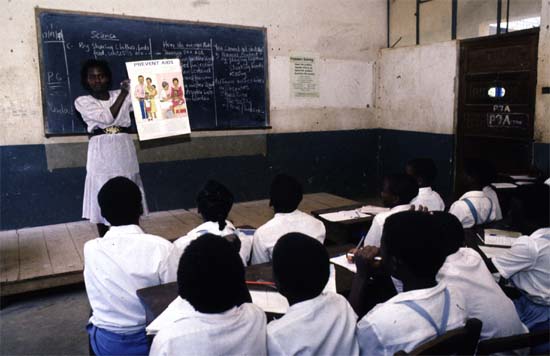
David Doherty, Peace Corps Volunteer in Haiti, writes about HIV/AIDS Education
David Doherty, Peace Corps in Haiti
David Doherty is a refugee from all things functional or organized. In other words, he is a Peace Corps volunteer serving in Haiti.
Monday | Tuesday
Tuesday, 09 Dec 2003
CAMP PERRIN, Haiti.
Haitian Proverb: Moun grangou pa ka tande
"A hungry man cannot hear."
Outside Port-au-Prince, Haitian families average six to nine people.
Haiti is hallowed ground in much the same way as Gettysburg or Flanders Field. The war is over and the carcass of the environment has been buried under a field devoid of arable soil, potable water, or prospects for resurrection. It should be noted that somewhere between 8 million and 12 million people (no one is really certain) are wandering between the headstones trying to eke out a living and very few of them seem ready to take on the caretaker role. Jacques Cousteau described Haiti as a land beyond environmental redemption. The scourge of AIDS threatens to accelerate the fulfillment of his prophecy.
National statistics are so unreliable as to be laughable. The official U.N. AIDS website cites the HIV infection rate among Haiti's population as 6.5 percent. International service organizations working within Haiti assume the figure is between 13 and 18 percent. Doctors working in the community estimate that as much as 40 percent of the population may be HIV-positive.
One of the oldest and most respected AIDS-related research programs is in Port-au-Prince. The organization can make educated guesses about HIV infection in the capital city, but no one can speculate on a national level because not enough is being done (outside of a few highly publicized efforts -- Dr. Paul Farmer, Albert Schweitzer Hospital, etc.) in the provinces where 75 percent of the people live.
Every Peace Corps volunteer has a mandate to work in areas of AIDS education and awareness. In a country where open discussion of sex is taboo, this presents certain challenges. (As the average age for girls to commence sexual activity is 12, it may be that many lack sufficient maturity to have a serious conversation on the topic.) In collaboration with a health volunteer living in nearby Cance -- a Paris- and Haiti-educated physician who directs an environmental NGO called ORE -- we have started to tackle the problem in our area.
This day has been dedicated to laying the groundwork for doing a school census, establishing a working framework with the local hospital, and obtaining the various and sundry official sanctions that are necessary for anything related to health or education. (In a country having a government with a world-class inability to manage anything, it is usually counterproductive to work within the system. However, the health and education ministries would rather do a bad job than no job at all, so we must deal with them.) As I live in an enlightened part of Haiti, all the parts seemed to work smoothly today.
Now comes the hard part. My Peace Corps counterpart, Jennifer Morley, and I must travel the back roads and cross the occasionally raging Ravine du Sud in order to identify resources within each of the 58 primary and secondary schools in the commune of Camp Perrin. Students must be counted and grouped by grade, gender, and age. (One big problem in Haitian schools is the range of ages within a single class. It is normal to find 19- or 20-year-old males in the fifth grade sitting side-by-side with 12- to 13-year-old girls. This is a high-risk mix of hormonally driven older males with younger girls in search of identity and acceptance.) This is no mean feat as the official unofficial tally for primary school students in the area is nearly 11,000. Secondary schools add another 8,000 to 9,000 young people.
Once we have collected this information and performed the sleight of hand usually reserved for statisticians in the Congressional Budget Office, we will work with an Arlington, Va.-based NGO called Family Health International. Using funding from the U.S. Agency for International Development, they have developed seminars for training HIV/AIDS educators and for implementing comprehensive medical programs that include free HIV testing and intervention for pregnant women (including drugs that can dramatically reduce the incidence of mother-to-child transmission). We hope that in later years, the antiretroviral programs will be extended as well.
I am already over the legal length limit for today's diary entry, but I felt that a discussion of HIV/AIDS was critical to understanding yet another of the underlying reasons for the decline of what was once the most profitable colony in the world. (Just prior to achieving independence, Haiti accounted for between 30 percent and 50 percent of France's worldwide GDP!)
As with many sub-Saharan countries, life expectancy is dropping and the number of AIDS orphans is climbing. Coupled with a high birth rate (4.7 live births per woman) and a declining child mortality rate (270 per 1000 10 years ago; 130 per 1000 today, thanks to international efforts), the rising number of AIDS-related deaths has contributed to a situation where nearly half the population is under the age of 14. The already depleted environment cannot possibly keep pace with the increasing population (expected to double by 2027).
